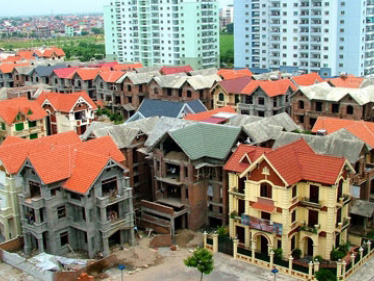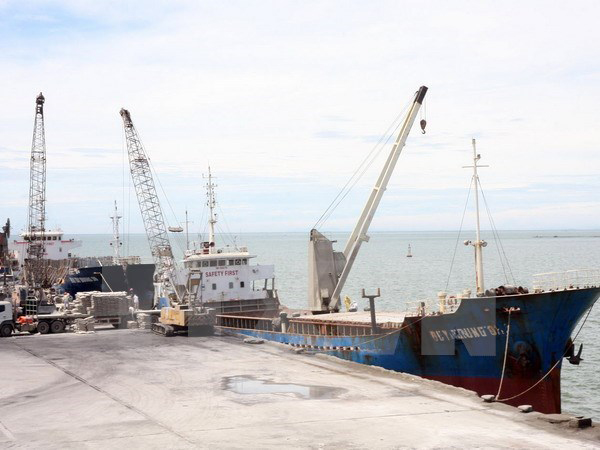
Real Estate Lays Golden Eggs
Vietnam's real estate market in 2015 has shown positive signals for a clearer recovery of the market. Entering 2016, the majority of experts and policy makers believe that the real estate market will thrive.
An opportunity to accelerate the real estate market
According to Mr Nguyen Manh Ha, former Director of the Department of Housing and Real Estate Management, Ministry of Construction (MOC), in 2016, the property market will continue to rebound with stronger growth than in 2015. The characteristic of Vietnam's real estate market is that the market is governed and influenced by other markets, such as the financial market and stock market, so when the macro economy is stable and thriving, there will be growing opportunities for this market to develop well in 2016.
According to economic experts like Prof Dang Hung Vo, former Deputy Minister of the Natural Resources and Environment, and Dr Tran Tri Hieu, a real estate bubble will not occur in next three or four years. The market in 2016 will have strong growth, although concern about the real estate bubble is still affecting the decisions of some people. Explaining this statement, Mr Vo analysed that the positive signs of the property market are reflected by the total outstanding loans in 2015 of VND342 trillion, while residential sector has accounted for 39 per cent; inventories fell sharply on each segment, particularly in the two major cities, Hanoi and Ho Chi Minh City.
However, Mr Vo also pointed out current weaknesses of the property market and solutions to fix the problems in the shortest time, such as diversified products, additional medium and long term funding for the real estate market, reduced interest rates when the worldwide interest rates of many countries have fallen, untie mortgaged real estate projects in foreign banks for loans as such banks have a larger number of medium and long term capitals at cheaper price than the domestic banks.
Dr Can Van Luc, Senior Advisor to the BIDV said that the transformation of the world economy and trends of international cooperation will have a strong impact on the property market; both positive and negative factors are present, but the positive ones still dominate.
Concerns of foreign investors
Although people's confidence in the property market is growing steadily, the development of the market has not created a necessary balance. The number of the real estate companies focusing on high-end residential projects is larger than in the medium and low segments, which seem to be ignored.
According to Dr Dang Hung Vo, real estate companies need a lot of measures to diversify the capital and commodity markets. The property market is currently requiring major brands to gain public confidence. It will be an opportunity as well as a challenge for domestic investors.
Evaluating opportunities of the real estate market in Vietnam, Mr Jeff Foo, Chairman of Real Estate Brokers Association of Singapore, said that the new policy of the government of Vietnam on the real estate market will help establish a balanced market with more transparency and more sustainability in the coming period. However, foreign investors still need time to observe and assess the market's opportunities before deciding to invest.
"We are concerned about when foreign investor cash flows enter the Vietnam market, will the state policy will be adjusted or not? And after 5 or 10 years, how will such the policies be changed? This is what investors are very concerned about, because they find it difficult to predict such elements before investing in Vietnam," said Jeff Foo.
Besides, some foreign investors still have concerns that the housing policy in particular and the policies for the real estate market in general should be built for long term and they should be transparent and stable in response to the impacts of the economic environment. If Vietnam creates a sustainable real estate market, it will attract a large number of the foreign investors to participate.
According to Jeff Foo, a positive point in the process of Vietnam's opening up for foreign investment flows is that there are more types of investment to Vietnam, some of which come from Singapore. Investors will buy the properties in Vietnam and participate in the domestic market to develop commercial real estate projects, even hotels.
None of real estate bubbles are likely to happen
Prof Dang Hung Vo, former Deputy Minister of Natural Resources and Environment
In my opinion, from 2016 to the next 3 years, the real estate bubble will not happen because the consistency of the real estate market is very high and its inertia is also very large. The market's transaction line is still horizontal so there will be not a bubble scenario happening in the near future.
There are inventory problems, known as a consequence of the investment process with super profitability, which need to be liberated. Besides, the market needs a diversification of professional products in medium and long terms. Besides, more policies should be open to foreigners to help them to have more opportunities to own houses in Vietnam.
2016 to witness a fierce competition
Mr Nguyen Ba Sang, General Director of the An Gia Investment
The year 2015 ended with a fairly active market. The most significant recognition of the market in 2015 was the strong return of the middle and high-end segments, along with the reactivation of many construction projects that had been delayed over the years due to lack of funds.
The year of 2016 will see multiple projects opened for sale. However, this will also be a challenge to the market because the supply is added, which forces the investors to consider competition issues. Enterprises with good projects, strong financial resources and a professional sales team will continue to grow. Otherwise, they will be shut down.
In 2016, there will be fierce competition, especially between brand-name investors with high reputations on the market. This is also the booming trend of in the M & A projects. This will be an opportunity to reduce the current property inventories
The risks of imbalance in supply and demand
Mr Nguyen Huu Khoa, Deputy Director of Cityland
The property market is warming with growth in the middle and high segments, which happened in the past. When the market gets warmer, investors usually focus on developing the high-end segment. This is the most profitable investment channel. In 2016, it continues to be the mainstream of the market. This raises concerns about the mismatching of supply and demand because most buyers now have real demand for the middle and low housing price segment with a price below VND15 million per m2. But now, the supply of this segment is quite scarce. This reflects the fact that the policy for housing development for low-income people is not effective and buyers still have difficulty finding products that suit their pockets.
Luong Tuan
VCCI News







.jpg)